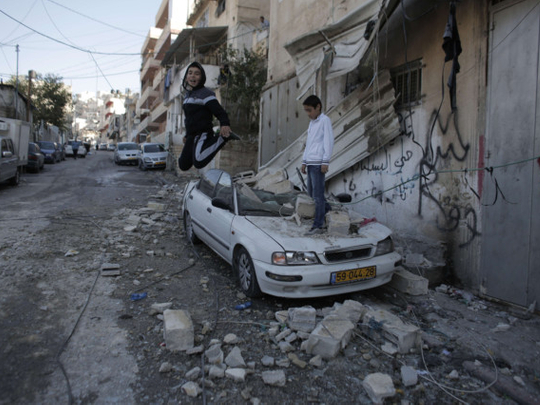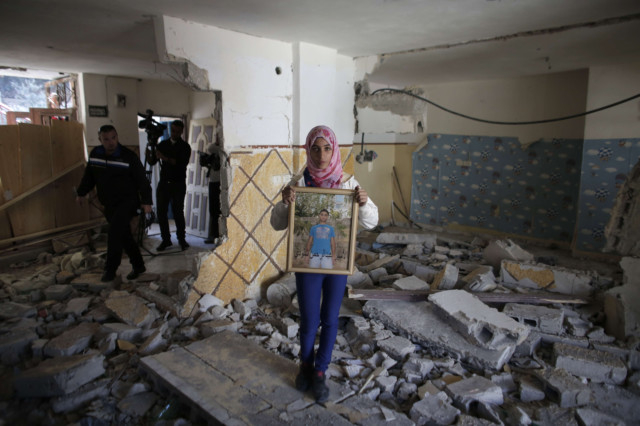
Dubai: The Israeli regime demolished the occupied east Jerusalem home of a Palestinian who carried out a deadly October attack, just hours after Prime Minister Benjamin Netanyahu promised strict security measures in the wake of a synagogue assault a day earlier.
The synagogue attack, which left five people dead, was the deadliest in occupied Jerusalem since 2008 and came amid weeks of violence linked to repeated Israeli raids of Al Haram Al Sharif. Nearly a dozen people have been killed in attacks by Palestinians using guns, knives and vehicles.
The house demolished in the Silwan neighbourhood near the Old City belonged to Abdul Rahman Al Shaludi, who killed two people last month when he drove his car into a crowd standing on a light rail platform in the occupied city.
In recent weeks, a total of 11 people have died at the hands of Palestinian attackers — most in occupied Jerusalem but also in Tel Aviv and the West Bank.
On Tuesday two Palestinian cousins wielding meat cleavers, knives and handguns stormed a synagogue in the west Jerusalem neighbourhood of Har Nof, killing four worshippers and a policeman. The two assailants were shot dead by police.
Responding to Tuesday’s attack, Netanyahu said he had ordered security forces to hit back hard at Palestinians involved in violence against Israelis, and to resume the policy of home demolitions, a punitive tactic that has caused much controversy in the past.
“I have ordered the destruction of the homes of the Palestinians who carried out this massacre and to speed up the demolitions of those who carried out previous attacks,” Netanyahu said late on Tuesday.
‘Proud’
Sitting amid the rubble of the family home demolished early on Wednesday, Al Shaludi’s grandmother said she was proud of his actions.
“No one should feel sorry for us, for our demolished home,” she said, refusing to give her full name for fear of reprisals.
Jewish worshippers meanwhile returned on Wednesday to the scene of the attack, the Kehilat Bnei Torah synagogue, seeking comfort in prayer. One of them, Gavriel Cohen, said the attack showed “that our future in this world is dependent on God.”
All four of the congregants killed in the attack immigrated to Israel from English-speaking countries — three from the United States, and one from Britain. The Israeli regime grants the right of citizenship to anyone in the world who can prove Jewish ancestry. Indigenous Palestinian refugees forced to leave their homes by Israel are however barred from returning to their homelands.
In recent weeks, occupied Jerusalem has seen its worst sustained bout of violence since a Palestinian uprising a decade ago. Al Shaludi’s attack killed a three-month-old baby girl and a 22-year-old woman as he rammed his car into the train stop before he was shot dead by police.
Much of the violence stems from tensions surrounding regime-sanctioned raids on Al Haram Al Sharif by extremist Jews. The location is revered by Jews as the site of the ancient Hebrew temples.
Punitive demolition was a tactic frequently employed by Israeli security forces before defence chiefs decided to suspend it in 2005 after concluding it was not an effective deterrent. Critics have decried the measures as collective punishment.
Since then it has been used occasionally — three times in occupied east Jerusalem in 2009, and three times over the summer in response to the killing of an Israeli policeman and the murder of three Israeli teenagers.
— with inputs from AP













